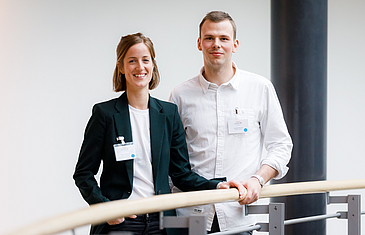This was worth an award from the Stifterverband für die Deutsche Wissenschaft [Sponsors of Science in Germany] and the Amazon Corporation. A prominent jury selected 15 winners out of the 160 proposals received for the funding initiative “digital.engagiert” [digital.commitment]. The funding initiative supports projects that promote the digitalization of civil society. It wants to give the 15 participating teams the best possible support and appropriate expertise to realize their project ideas. For example, Kirsten Hillebrand and Hendrik Hinrichs not only receive 5,000 euro start-up funding for the development phase of their digital assistant. They are also supported for half a year by a personal coach, have the opportunity to participate in workshops, make contacts and network. This time round, the total amount of funding was once again increased. Overall, Amazon and Stifterverband are sponsoring the initiative with 150,000 euro. “It’s a great success for us to be selected with our project,” says Kirsten Hillebrand. The two young Bremen economists are particularly looking forward to the upcoming training program.
How the eco-robot helps in everyday life
What’s behind KARL and how does it work in everyday life? The name “eco-robot” sums it up: KARL is actually a so-called chatbot: An interactive innovation that bundles traditional apps into one service. Chatbots are a text-based dialogue system that allows chatting via a technical system. The chatbot can access large amounts of data and is a self-learning system that adapts to the needs of the user based on data structures. “We want consumers to behave in a manner consistent with their convictions. Sometimes this is not so easy to keep up in everyday life,” says Kirsten Hillebrand. She holds a PhD in Business Administration (supervisor Professor Lars Hornuf) with a focus on digitalization and behavioral economics. Hendrik Hinrichs also wrote his master's thesis in this field. “The chatbot gets to know the person who uses it autonomously and becomes a real interaction partner,” he says.
No finger wagging
How does it work in everyday life? “The assistant is a friend, not a finger wagger,” emphasize the developers. He proactively sends messages and sustainable recipes, helps with the selection of groceries, refers to regional products, and helps with purchasing decisions. For example, he knows from the current weather data that “the weather is good,” and messages “Ride your bike to university today. That consumes 150 calories.” The two are quick to point out that KARL is a scientific product. He creates his recommendations for what to do on the basis of an algorithm. “The eco-chatbot should enable users to behave sustainably within their individual comfort zones,” says Kirsten Hillebrand. It is about turning good intentions into concrete actions.
More information under: www.digitalengagiert.de
Members of the press: A photo of the two prizewinners can be downloaded under: https://seafile.zfn.uni-bremen.de/f/707ce0e6fb4549c18920/
If you would like to have more information on this topic, feel free to contact:
Kirsten Hillebrand
Research Associate
University of Bremen
Faculty of Business Studies and Economics
Chair for Business Studies,
Financial Services and Financial Technologies
Phone: 0170 2984 375
Email: kirstenprotect me ?!klimakarlprotect me ?!.de
Hendrik Hinrichs
Telefon: 0176 61335 522
Email: hendrikprotect me ?!klimakarlprotect me ?!.de

